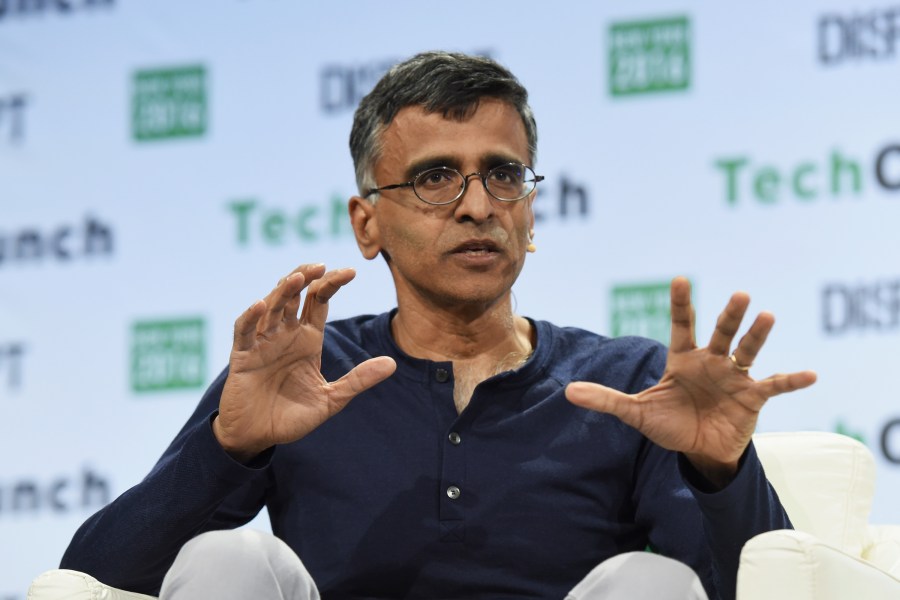The founder of a new ad-free search engine bets people will pay for privacy

When you search for something online, chances are you Google it. The company handles about 90% of search traffic globally and makes money by selling ads based on the things it knows about you. But, there are competitors offering the ability to search privately, including a new one from folks who learned the trade at Google.
Sridhar Ramaswamy worked in ads at Google for 15 years. He’s the co-founder of Neeva — an ad-free, subscription-based search engine that launches Tuesday. But why would people pay $4.95 a month for something they’re used to getting for “free?” The following is an edited transcript of our conversation.
Sridhar Ramaswamy: It’s more than privacy. In my mind, what we have learned over the past 10 years is that if a product is free, then you are the product. The $150 billion made in search advertising, paid by advertisers, that’s actually coming from you and me. So, this is a cost that all of us are bearing, and in many, many ways, we think that a customer-first model, where people pay a small fee, serves us all better over the long term. And all of us pay for the water that comes to our tap. It’s a high-quality, low-cost product. We don’t mind it because it delivers such immense value. I feel that online services should be more similar to the water that comes through our tap than some hidden mechanism that makes gobs and gobs of money without really our knowing, but eventually, we are paying for those products.
Amy Scott: So as users begin to try this out, what do you want them to know about the experience so they don’t get frustrated and just hop over to Google or give up? I mean, is it going to be a worse experience?
Ramaswamy: Initially, we encourage our early adopters to give us feedback. That’s what makes the product better. We’re just getting started in creating this search engine. We see us very much as a complement to Google. You know, are we satisfied with where we are? Absolutely not. But I’d have given you the same answer if I were working at Google on search quality. It is an ongoing journey.
Scott: When you say Neeva will be a complement to Google, do you mean at the individual level, so people will use both here and there? Or do you see it kind of dividing into the Neeva camp and the Google camp?
Ramaswamy: So, I think people generally make decisions about what they want to use as their primary search engine. And so for a particular user, for example, what they set as the default search engine ends up being the search engine that gets most of their queries. For example, clearly, I’m a Neeva user, but occasionally, I’ll want to look at a Google Scholar because it is a specialized site that offers things that Neeva does not yet offer. So we do think of this as a choice at the user level.
Scott: So you said you already have thousands of users who’ve been testing this out. What do you know about what drew them to this? Are they mostly concerned about privacy or wanting an ad-free experience?
Ramaswamy: Well, for us, the magic phrase that gets people going is “ad-free private search engine.” That’s what the majority of the people that try Neeva try it out for. And then in terms of segments of people that have shown an affinity with Neeva, Neeva has been a big hit with parents, with moms that do a lot of purchasing online, for example. They like the influence-free experience that they get with Neeva. It has also been a hit with senior citizens because there’s a lot of worry and concern about being tracked, about clicking on the wrong link and phones doing strange things when you do that. That security that we bring to them, both in the ad-free experience, but also in doing things like preventing tracking, resonates a lot with them. And so it becomes a combination of things. Different people end up liking different aspects of Neeva. But “ads-free private” gets them going.
Scott: As we discussed, you were at Google for a long time. Did you ever think about trying to create change within, instead?
Ramaswamy: So I led a lot of big changes at Google, and I did not really think that a project like this was something that could be attempted from within the company. It goes too close to the foundational principles of how a company operates. It’s possible that one makes less money on the whole with the subscription-driven companies. Starting over from scratch lets you focus on achieving that success as opposed to worrying about replacement revenue, which is always hard for a company.
Scott: Misinformation has obviously been a huge challenge for anyone working in the internet and for Google. How do you plan to counter that?
Ramaswamy: Well, at one level, we want our users, our customers to have control over this. So this is why we let people tell us what their preferred news providers are, so when you look for news, those are prioritized higher. We’re also actively looking into working with companies like NewsGuard that actually create a nutrition label for news. In general, helping people navigate the online world with much more information about what kind of site they are looking at, and how trustworthy the information is, is something that we think is a core part of our mission. For example, on programming queries, we want to make sure that people can easily tell between official sites providing documentation and ad-supported sites that sometimes are good, but are generally of uneven quality. Similarly, we are working on a project for medical queries where you will be able to see what information is from a government site or a nonprofit like a hospital or a reputable educational institution, as opposed to some site that has some content contributed mostly by anonymous writers and that may or may not have editorial boards. Previous search engines have largely stayed away from revealing any of this kind of information because of this belief that getting it is unscalable. So we think we can do a lot more in helping people understand the provenance of information and understand the motivations of the different kinds of sites that there are, and really helping them make better decisions as they look for and consume information around the internet.
Scott: It seems, though, by giving people the preference of their news sites, you risk a little bit of the echo chamber issue. How do you think about access to information in terms of customizing to the point of excluding opposing views?
Ramaswamy: I mean, some of this stuff is already happening in the sense that we don’t have subscriptions to every possible site out there. We are expressing our preferences, and what Neeva does is it helps you get to the sites that you already have a relationship with or have a preference for. Your broader point about unwittingly creating echo chambers is certainly important, and the kind of things that we want to do there are things like being able to see viewpoints of somebody else. So one of the things that we have talked about is can we get some of our more well-known Neeva customers to have their preferences be publicly available? So, we have ideas like that for how we continue to have, to offer broad points of view to, to people.
Scott: Finally, tell me about the name.
Ramaswamy: Oh, I wish I had a clever story to tell you about “Neeva.” It’s really hard to find a name. And so, we made a list of syllables whose names we liked, and I literally wrote a program to generate all two-syllable names and Neeva is the best one that we could manage. It took, like, a year and a half to get “Neeva.com” after that.
Related links: More insight from Amy Scott
I spent a little time Neeva-ing, with mixed results. I searched for coffee shop and got results for Gainesville, Florida; Georgia, Indianapolis and Phoenix. Which is fine, but my location was set to Baltimore. It is early days.
To give you a sense of just how high the hill is that Neeva is trying to climb, reporter Daisuke Wakabayashi had a story in The New York Times last year about why Google is so dominant in search and why it will be hard for anyone to catch up. At the time, Google had indexed an estimated 500 to 600 billion web pages, a number that just keeps growing.
Its closest competitor, Microsoft’s Bing, had indexed between 100 and 200 billion. Because of Google’s dominance, websites often give better access to Google’s web crawlers — the computers that scan the web to index content. Software engineer Zack Maril did extensive research and found that sites including PBS Kids, Alibaba and ScienceDirect gave Google’s crawlers access to content they denied to others. Doing all that web crawling to build an index is expensive, one reason startups have failed or rely on the work of others. Neeva said it’s doing some of its own crawling but also using Bing’s application programming interface for basic search results.
And Neeva isn’t the only search engine that offers privacy to its users. DuckDuckGo doesn’t track you around the web or share your data, and the ad-blocking browser Brave is now offering a private search function in beta called Brave Search. Brave is building an independent index of the web but will incorporate results from Google and Bing. The plan is to offer a free, ad-supported version and a paid option with no ads.
Finally, Google itself has been pledging to offer users more privacy. Last year, the company said it would no longer allow third-party cookies on its Chrome browser by 2022. Advertisers use those cookies to track your browsing data and show you targeted ads, and many wanted more time to adjust to the new technology that will replace cookies. Some were also not yet sold on Google’s claims that its replacements would be nearly as effective as cookies. Now Google is delaying those plans by a year, saying it needs to move at a “responsible pace.”
It’s been great being with you this past month while Molly Wood is on assignment. Wednesday, Kimberly Adams takes over for a while.
The future of this podcast starts with you.
Every day, the “Marketplace Tech” team demystifies the digital economy with stories that explore more than just Big Tech. We’re committed to covering topics that matter to you and the world around us, diving deep into how technology intersects with climate change, inequity, and disinformation.
As part of a nonprofit newsroom, we’re counting on listeners like you to keep this public service paywall-free and available to all.
Support “Marketplace Tech” in any amount today and become a partner in our mission.


















